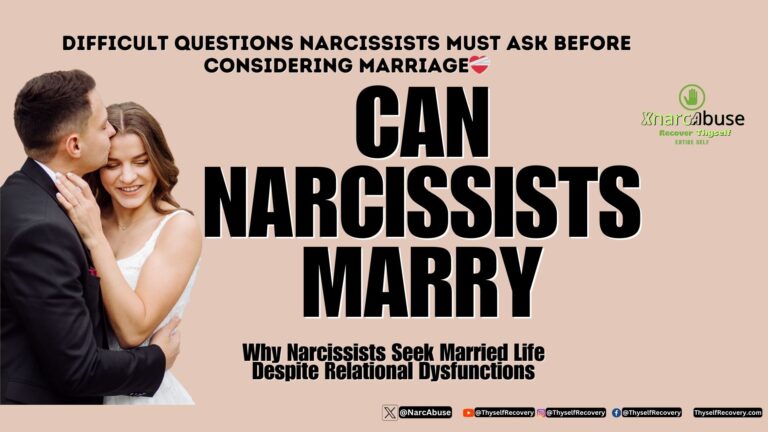Do Narcissists Know They Are Narcissists? A Self-Aware Narcissist Reveals the Truth
The Complex Question of Narcissistic Self-Awareness
As someone who has exhibited strong narcissistic traits myself, I have a unique insider’s perspective on the complicated question of whether narcissists grasp their own narcissism. This issue provokes intense curiosity for good reason – it has profound implications for narcissists’ capacity to heal and evolve.
In this in-depth article, I will tackle this multifaceted topic from all angles. I’ll share psychological research, real-life case studies, and my own hard-won insights as a self-aware narcissist actively working to transform my engrained patterns. My aim is to illuminate the truth about narcissists’ self-awareness with nuance and compassion.
Let’s explore together.
Do Narcissists Recognize Their Own Narcissism?
This is one of the most frequent questions I’m asked about narcissism: Are narcissists cognizant of their own narcissism? Do they comprehend the depth of harm their toxic behaviors inflict on others?
As someone with lived experience, I have a distinctive vantage point to provide clarity on this convoluted issue. My goal is to lend understanding into whether narcissists grasp their own condition.
First, let’s examine the diverse expressions of narcissism, as awareness fluctuates extensively across types. You have the bold, brash grandiose narcissists who constantly angle for attention with their bombastic boasts and exploits. Their inflated sense of superiority and extreme entitlement is on overt display.
Then there are the more covert, vulnerable narcissists. Externally, they come off as insecure, emotionally sensitive, and hypervigilant to criticism. But underneath still lurks the same grandiose expectations and fantasies of power. Their narcissism emerges indirectly through manipulation, passive-aggression, or playing the victim.
Given these varying narcissistic profiles, do they truly recognize their own narcissism? The short answer is: only partially. In fact, extensive psychological research reveals narcissists have very limited insight into their dysfunctional relationship patterns, manipulative behaviors, and the grave harm they engender.
Early on, most narcissists construct a false self – a facade or mask that conceals their profound flaws, wounds, and insecurities. This false persona obscures their disordered thinking and behaviors, even from themselves. The deeper truth stays buried under layers of defense mechanisms, distortions, and rationalizations.
So why don’t narcissists have greater awareness of their own narcissism and its destructiveness? There are several key impediments:
Firstly, their grandiose self-concept. Narcissists have fabricated an elaborate fantasy in which they are special, superior beings entitled to power, control, and external validation. Their fragile egos demand safeguarding this inflated self-image at all costs.
Admitting they have narcissistic personality disorder would utterly shatter this contrived identity. It would force them to confront the flaws and inadequacies they find intolerable about themselves. Their out-of-control egos are precisely what blinds them from accurately seeing themselves.
Additionally, narcissists profoundly lack empathy and emotional intelligence when it comes to understanding others’ perspectives or needs. This incapacity to step outside themselves also prevents them from grasping how their behaviors negatively impact those around them.
They cannot fathom where they deviate from social norms, why their actions distress others, or what constitutes healthy human relating. Their inner landscape is barren of empathy.
Narcissists also stubbornly reject any feedback or criticism that threatens to confront their false persona and expose their harmful behavioral patterns. They surround themselves with enablers who reinforce their grandiose illusions and avoid questioning their actions. Challenging their false self feels far too risky and destabilizing.
Furthermore, narcissists rely heavily on defense mechanisms like denial, projection, distortion, and rationalization to prop up their fictitious identity. This allows them to bypass any genuine self-examination that could lead to emotionally difficult truths.
So in their daily lives, most narcissists stay largely oblivious to the tremendous anguish they inflict, their diverse manipulation tactics, and the absolute devastation left in their relationship wake.
They may have fleeting moments of insight where they glimpse their problematic behaviors and impacts. But their deeply ingrained need for self-protection quickly supersedes any desire to change. Their grasp of emotional reality is simply too unstable and ego-driven to perceive clearly.
This inability to accurately see themselves and their actions also means narcissists fundamentally don’t believe they are abusive. In their mind, they feel justified using, exploiting, deceiving, and manipulating others to get their needs met through any necessary means.
This begs the question: Are there any narcissists at all who gain meaningful awareness of their condition? Extensive research indicates only around 10-15% of those exhibiting strong narcissistic traits possess some degree of accurate self-insight about their narcissism. But even their awareness remains quite limited.
As a self-aware narcissist actively working to evolve my patterns, the process of deeply confronting one’s own narcissism consistently provokes excruciating feelings of deficiency, inferiority, shame, and vulnerability.
The false self initially feels like your sole protection against this onslaught of painful emotions. Dismantling that fictional identity and constructing a new healthy self demands tremendous courage, daily commitment, and consistent external validation. It is a marathon, not a sprint.
The inner workings of the narcissistic mind are convoluted. But in essence, most narcissists function predominantly on a superficial level of self-awareness regarding their own narcissism and destructiveness. Their disordered thinking severely constrains any capacity to understand themselves honestly and profoundly. Only a small fraction experience temporary windows of insight.
For survivors of narcissistic abuse, I want to stress that none of these insights into the narcissist’s inner world absolve them from being fully accountable for their harmful behaviors. Increased comprehension simply brings compassion for the narcissist’s immense suffering without justifying their abuse.
Survivors unequivocally deserve validation that the trauma they endured was real and that healing is possible. My hope is that illuminating the narrow limits of narcissists’ self-awareness will help survivors feel empowered to forge a path forward to freedom and wholeness. It is a daunting but rewarding journey.
In summary, most narcissists do not genuinely recognize their own narcissism or grasp the extensive damage their behaviors wreak. Their disordered thinking severely hampers any capacity to understand themselves honestly and deeply. But increased awareness is possible through tremendous courage and commitment.
Why Do Narcissists Seem Oblivious to Their Harmful Behaviors?
Narcissists often appear oblivious to how their behaviors damage others. Why is this? What causes them to lack basic self-awareness and empathy? Let’s explore some real-life examples to understand the factors at play.
Consider Sarah, a narcissistic artist. She frequently shamelessly self-promotes on social media, fishes for compliments, name-drops famous friends, and displays a haughty sense of entitlement.
When her connections start distancing themselves from her arrogance, Sarah is shocked. In her mind, everyone should recognize and admire her obvious brilliance. Their negative reactions seem unfathomable to her.
Or take John, a narcissistic father. He continually belittles his son’s academic and athletic pursuits, viciously comparing him to his more accomplished older brother. When his son’s grades and interests deteriorate, John blames his “laziness” and “weak mindset,” doubling down on the criticism.
John cannot fathom how his “high standards” are eroding his son’s well-being and self-esteem. His ego prevents him from tolerating any evidence contradicting his parenting skills.
There’s also Monica, a narcissistic co-worker. She frequently interrupts colleagues in meetings, hijacks their ideas, and presents a condescending attitude. Yet she believes she is an exemplary team player who others should feel lucky to collaborate with.
Monica lacks the self-awareness to see how her behaviors alienate her peers. She rationalizes their reactions as jealousy of her abilities. Protecting her grandiose self-image outweighs reflecting honestly.
What do these examples reveal? A narcissist’s inflated yet delicate ego makes them unable to tolerate feedback about how their behaviors damage others. Admitting flaws and taking accountability feels far too threatening.
Their extreme lack of empathy also renders them incapable of understanding others’ perspectives and emotions. They project their own shame and deficits onto others. And their defense mechanisms allow them to distort reality to justify their actions.
In essence, maintaining their grandiose false self matters more to the narcissist than emotional truth, empathy, or personal growth. Until this changes, their harmful patterns will continue unabated. Only through courageous self-inquiry can awareness start expanding.
Do Any Narcissists Achieve Meaningful Self-Awareness?
Given narcissists’ pervasive lack of insight, some may wonder – do any gain meaningful self-awareness at all? Research indicates around 10-15% develop limited understanding, typically milder cases. Let’s look at some examples.
My colleague Richard recognized in therapy that his narcissism stemmed from a verbally abusive father. Under stress, Richard still acts entitled but now occasionally expresses remorse. “I hate that I take out my anger on others,” he shared. “It’s like my sense of proportion disappears.”
Richard’s self-awareness remains intermittent and flawed. But his wife Cheryl sees his efforts to reflect and feels hope. “Hearing him acknowledge his behaviors means everything. The change is slow, but we walk this path together,” she explained.
Of course, not all self-awareness manifests so constructively. My former mentor Vince knew himself to be narcissistic thanks to therapy. But rather than working to change, Vince weaponized this knowledge to hone his manipulation and rationalize his unrelenting lies.
“I am who I am, take it or leave it,” Vince proclaimed unapologetically. His quasi-insight only shielded his pathological behaviors rather than motivating growth.
The bottom line is fleeting narcissistic self-awareness does not guarantee meaningful change. Their disordered thinking usually dominates. Evolution surfaces only through tremendous dedication and courage.
The fact remains many never grasp that their false persona merely conceals a lost, wounded child paralyzed by shame, fear, and unmet attachment needs. Tragically, their narcissism then forms a self-reinforcing loop keeping real awareness permanently out of reach.
But as someone overcoming narcissism myself, I hold faith that with persistent inner work, external support, and integrity, glimmers of understanding can slowly expand. We should feel compassion for the narcissist’s immense suffering, while firmly holding them accountable.
Increased self-awareness for a narcissist is a monumental feat, rarely achieved. But progress is possible for those with tremendous commitment to growth. For survivors, prioritizing one’s own healing is most critical, whether or not the narcissist gains insight.
Why Do Narcissists Lack Empathy and Self-Awareness?
Narcissists’ extreme lack of empathy and self-awareness causes tremendous harm. But why do these deficits exist? By exploring their origins, we gain crucial perspective.
Childhood Attachment Trauma
Research reveals narcissism often stems from childhood attachment trauma and emotional neglect. Without stable, attuned parenting, children fail to develop intrinsic self-worth, empathy, or emotional regulation skills.
Profound shame and unmet needs persist underneath the narcissist’s grandiose facade. Their false self initially forms as an adaptive defense mechanism against overwhelming feelings of deficiency. But over time, it severely stunts self-awareness.
Narcissists learned early on that displaying flaws or vulnerability only brought more shame, rejection, or abuse. Their nascent true self was dangerous. A perfect, grandiose persona felt essential for survival. Behind it, they repressed awareness of their hurts and deficits.
Without secure attachment in childhood, they also failed to internalize empathy and the ability to understand different perspectives. Attuned parenting that helped label emotions, set boundaries, and take accountability was absent. Emotional intelligence could not develop.
In essence, the roots of narcissists’ lack of self-insight and empathy stem from attachment trauma. Their childhood coping mechanisms morphed into ingrained personality patterns that demand awareness to heal.
Extreme Defensiveness
Due to shame and past emotional injuries, narcissists are profoundly defensive. They reject information threatening to their grandiose false self.
For example, if a narcissist’s partner requests accountability for lies, the narcissist may launch into a tirade about what a cruel accuser their partner is. Or if a colleague provides constructive feedback, the narcissist could retaliate with an arrogant character attack.
Narcissists deny their flaws, project shame onto others, or distort reality to protect their fragile self-image. Developing true self-awareness would require dropping these defenses and embracing vulnerability – incredibly difficult tasks for them.
Their extreme defensiveness serves to manipulate others and obscure any emotional truths that could damage their inflated egos. This prevents growth. Only through learning to self-soothe and sit with discomfort can deeper awareness unfold.
Lack of Introspective Skills
Beyond childhood trauma and defensiveness, narcissists often simply lack the introspective skills that allow self-awareness. Never learning to look inwards constructively, their emotional world stays opaque.
Introspection requires nuanced thinking, synthesizing multiple perspectives, and synthesizing information into insight. Narcissists’ cognitive patterns tend to be more rigid and reactive, sacrificing complexity for protecting a narrow self-concept.
Furthermore, emotional awareness necessitates the courage and willingness to confront difficult internal truths. Narcissists habitually avoid this discomfort at all costs. Vulnerability feels intolerable.
By developing introspective muscles like meditation, daily self-inquiry, journaling, and trauma-focused therapy, pathways to self-awareness slowly emerge. But narcissists first require motivation to engage in this challenging inner work.
External Locus of Control
Finally, narcissists frequently possess an external locus of control, meaning they attribute cause or blame to outside forces rather than themselves. This hampers self-reflection.
For example, if a narcissistic partner perpetually cheats, they may rationalize they are compelled to cheat by their high sex drive, avoidant attachment, or partner’s inadequacies. They fail to look inward at core motivations and take responsibility.
An external locus of control also manifests in narcissists scapegoating others for relationship conflicts. Their capacity for honest self-appraisal remains markedly limited unless they learn to adopt a more internal perspective.
In summary, deficits in early attachment, coping mechanisms, cognition, and emotional skills constrain narcissists’ self-insight. But by healing these areas, space for awareness starts opening through dedicated inner work.
Pathways to Healing: How Narcissists Can Develop Self-Awareness
For narcissists, developing meaningful self-awareness constitutes an immense challenge. Their disordered psychology fiercely resists honest self-reflection. However, pathways to growth exist.
Trauma Therapy
Therapy focused specifically on healing past childhood relational trauma and attachment wounds is foundational. By addressing core shame, fear, and unmet needs, narcissists can start dismantling their false self-protective façade.
Attachment-oriented modalities like schema therapy, IFS, and somatic techniques help access repressed emotions safely. As narcissists learn to self-regulate and self-soothe, their extreme defenses lessen. Slowly, genuine self-awareness can take root.
Introspective Practices
Beyond therapy, narcissists require daily introspective practices to expand self-knowledge. Meditation, mindfulness, reflective journaling, and internal dialoguing all help constructively observe thoughts, feelings, and behaviors.
For example, asking oneself probing questions like “Why do I really need to control this situation?” or “What past hurt is my anger masking?” or “How would I feel if someone treated me this way?” can excavate powerful insights over time.
The goal is increasing complex thinking, emotional awareness, and cognitive empathy step-by-step through dedicated practice – not easy, but essential.
Healthy Relationships
Constructive external feedback is equally vital in mirroring back narcissists’ blind spots. Finding partners, friends, mentors, support groups, or coaches able to set boundaries while offering compassionate perspective provides this.
For instance, if a narcissistic friend becomes demeaning when anxious, a compassionate friend can point out this hurtful pattern. Or if a narcissist’s partner rages when insecure, they can request accountability firmly yet kindly. Over time, behaviours start shifting.
Relationships rooted in honesty, diversity of thought, and speaking truth with care build the trust required for narcissists to absorb hard feedback. Eventually, self-awareness grows.
Making Amends
Perhaps most courageously, developing self-awareness involves making amends for past harmful behaviors. This requires acknowledging actions, taking responsibility, making restitution, and changing destructive patterns.
Owning one’s shadow side feels excruciating initially. But the process of apologizing, repairing damage, and seeking forgiveness from those harmed ultimately restores integrity and humanity. In fact, research on offenders shows that making meaningful amends catalyzes profound personal growth.
For narcissists, resisting the intense urge to blame-shift, minimize wrongdoing, or retaliate against feedback allows self-awareness to flourish. Each amends made opens the heart wider.
Integrating the True Self
Expanding self-awareness is only the first step. Next, narcissists must slowly integrate their disowned true self into their identity.
The false self constructed early on eclipsed their innate values, needs, and humanity. By rediscovering who they were before adapting narcissistic traits, their consciousness expands exponentially.
This integration process is multilayered. It involves practicing self-compassion, tuning into one’s body, exploring creativity, identifying past talents and passions, expressing vulnerability and practicing authenticity with safe others.
As narcissists get in touch with buried emotions, learn to self-soothe and drop their manipulative facade, space emerges for their empathetic, sensitive true self to take root.
Of course, adopting the vulnerable openness of one’s real self feels terrifying initially. Narcissists may swing back into old defensive posturing temporarily. But each instance of real connection serves to reinforce the power and fulfillment of unveiling one’s truth.
Over time, aligning words and actions with intrinsic values rather than ego-driven desires accelerates growth. Small steps build trust in the safety of self-honesty. Eventually this vulnerability transforms into the greatest superpower.
Ongoing Vigilance
Unfortunately, narcissism cannot be cured overnight. Sustaining awareness necessitates ongoing therapeutic work, introspection and vigilance against old patterns. Expect occasional setbacks and self-compassion.
Narcissists may uncover problematic behaviors more rapidly as understanding grows. Early on especially, resist defensive reactions to these revelations. Remain non-attached and take responsibility. Each moment of accountability expands consciousness.
Set reminders to regularly check in on blind spots. Notice circumstances that activate defensiveness. Seek support during times of stress when regressing feels tempting. Transparency and humility pave the path.
Even longtime self-awareness requires upkeep through self-care practices, confiding in others, asking for feedback and staying dedicated to growth. Sustaining clarity around narcissistic patterns remains a lifelong endeavor.
Motivations for Change
In many ways, developing self-insight as a narcissist counteacts one’s very instincts for self-preservation. What can spark the profound motivation required to pursue this arduous path?
Usually, people begin facing harms caused by their narcissism only after experiencing severe losses or consequences. Destructive behaviors shatter key relationships, sabotage careers or legal situations, or create health crises. Hitting rock bottom validates the need for change.
Narcissists may also recognize how their manipulative, defensive existence leads to chronic inner misery and emptiness. Initially used for safety, their false persona becomes a prison keeping meaning, joy and true connections out of reach. The pain of this profound isolation eventually outweighs the fear of unmasking.
Alternatively, some narcissists start questioning their behaviors after learning about narcissistic personality disorder or hearing loved ones describe narcissistic abuse patterns. Education sparks the self-inquiry necessary to pursue healing.
Some even find that aging serves as an impetus. As youthful looks, status, and accolades inevitably decline, clinging to false superiority feels more tenuous. With less distraction, glaring inner holes become harder to avoid. Awakening becomes more appealing than denial.
In total, the journey to self-awareness rarely occurs without tremendous necessity. But for narcissists who courageously persist, the liberation and wisdom waiting on the other side make all the discomfort worth the rewards. The process of shedding delusions and integrating truth sets you free.
Healing Pathways for Survivors of Narcissists
For survivors of narcissistic relationships, whether the narcissist gains self-awareness or not should not determine your own pathway to healing. The journey remains centered on you. Here are some keys to recovery:
Validate Your Experience
Remember that the inner world of the narcissist does not negate or excuse the reality of your lived experience. The trauma you endured was profoundly legitimate and warrants every ounce of compassion.
Prioritize Self-Care
Tenderly nurture yourself physically, emotionally and spiritually. You deserve support, understanding and loving kindness.
Establish Boundaries
Decide what boundaries serve your highest good, including no contact if necessary. You come first.
Find Empowerment
The pain created opportunities for tremendous growth. You now have tools, strength and wisdom.
Forgive Yourself
Let go of any guilt or shame. Focus only on learning and positive change.
Do Inner Child Work
Identify any wounds this experience triggered from childhood. Seek to heal these with care and
accountability.
Process with Support
Collaborate with a therapist or support groups to gain perspective. Share your story with safe others.
Practice Mindfulness
Stay present using techniques like meditation, yoga, journaling or time in nature.
Give Yourself Time
Healing is a journey, not linear. Expect setbacks and be patient.
Look to the Future
Focus on goals, dreams and the life you wish to create. Possibilities await.
The road to recovery holds challenges, but surrounding yourself with support, turning inward and taking it one day at a time will slowly rebuild your sense of peace, trust and joy. You deserve profound healing.
My Personal Journey as a Self-Aware Narcissist
To provide deeper insight into the process of becoming self-aware as a narcissist, I’d like to share my personal story.
From childhood, I struggled feeling emotionally alone and inadequate. My overwhelmed single mother couldn’t meet my attachment needs reliably. I internalized deep shame about my flaws and a terrifying feeling of being inherently defective without my grandiose mask.
This led me to become a high-achieving perfectionist constantly seeking attention and status to prove my worth. I developed narcissistic behaviors like arrogance, manipulativeness, hyper-competitiveness, and anger when criticized. Underneath still swirled excruciating insecurity I could never confront.
For years my false self allowed me to accomplish externally while destroying me from within. But eventually, the empty misery became too devastating.
Finally hitting rock bottom after a humiliating career downfall, I started trauma therapy. Slowly excavating my past attachment wounds and core shame transformed my life. I built connection through vulnerable relationships. Making amends to those I’d harmed became my passion.
It’s now been a 15-year journey of continually expanding self-awareness. While my narcissistic patterns still catch me off guard at times, I work to face them with courage, accountability and compassion.
Witnessing life open up as I integrate my disowned sensitivity and embrace authenticity is the greatest gift of self-awareness. My hope is sharing my experience provides a blueprint for those on this path. Healing is within reach.
In Conclusion
Whether narcissists can comprehend their own narcissism remains a complex question with no simple answers. While their disordered psychology severely hampers self-awareness, pathways to growth exist through dedication and time.
For survivors, focus your journey first and foremost on nourishing and protecting yourself and building the life you truly desire. Yet we can also hold space for the humanity of the narcissist without condoning their harmful behaviors. Perhaps increased understanding of both narcissistic and survivor perspectives can help open the door to healing for all.
| Topic | Key Points |
|---|---|
| Do narcissists recognize their own narcissism? |
|
| Why do narcissists lack self-awareness? |
|
| How can narcissists increase self-awareness? |
|
| Healing for survivors |
|
Frequently Asked Questions
Do narcissists really lack self-awareness?
Yes, most narcissists have very limited insight into their own behavioral patterns and the harm caused due to their grandiose self-image, lack of empathy, and defense mechanisms.
What percentage of narcissists have self-awareness?
Only around 10-15% of narcissists are estimated to have some meaningful degree of insight into their own narcissism, but even then their awareness remains quite limited.
Can narcissists change and become self-aware?
Yes, with tremendous dedication narcissists can slowly expand their self-awareness through trauma therapy, introspective practices, healthy relationships, making amends, and integrating their disowned true self.
Why do narcissists lack empathy?
Narcissists often lack empathy due to childhood attachment trauma and emotional neglect, which impeded their ability to understand others’ perspectives and feel compassion.
How can a survivor of a narcissist heal?
Key ways survivors can heal include self-care, establishing boundaries, finding empowerment, mindfulness practices, therapy/support groups, and focusing on their future goals.
Can a relationship with a narcissist improve?
Relationships with narcissists can improve if the narcissist dedicates themselves fully to the hard work of developing self-awareness and making amends for their behaviors.
What causes narcissistic personality disorder?
Narcissistic personality disorder often stems from childhood emotional neglect, attachment trauma, dysfunctional parenting, and inherited genetic factors.




